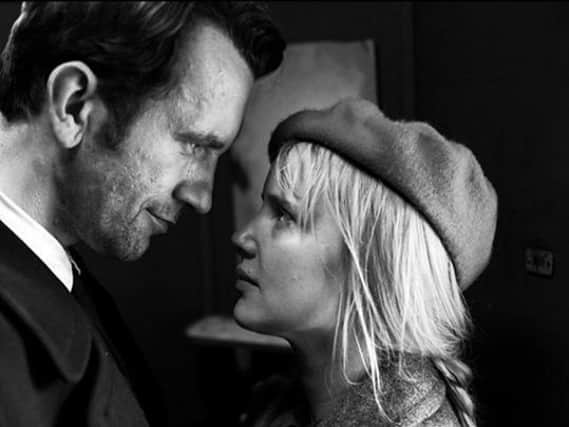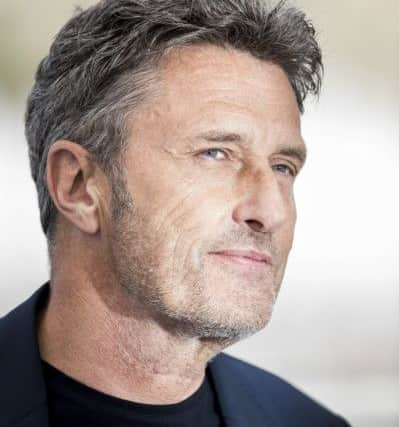Film interview: director Pavel Pawlikowski on his international love story, Cold War


Just how big can be gleaned from his new film, Cold War. Shot, like Ida, in evocative black-and-white and set against the massive political and cultural changes taking place across post-war Europe, the film follows the fiery relationship of a jazz musician called Wiktor (Tomasz Kot) and a folk singer called Zula (Joanna Kulig) as they pinball from country to country, their initial spark reigniting in ways both dreamy and destructive whenever their paths cross. It’s no accident that Wiktor and Zula are also the names of Pawlikowski’s parents: the relationship at the heart of film is largely inspired by their can’t-live-with-each-other/can’t-live-without-each-other dynamic.
“That was a big element of their relationship,” says Pawlikowski. “My mother was 17 when she met my father; he was ten years older. It was a great romantic love. Then they quarrelled [and split up]. Then they came together again and had me. And then they quarrelled again and divorced and had other partners, a husband even. Then they left the country separately. Then they met in the West again. And then they got together again. Then they managed to quarrel again and then, 40 years later, they died together.
Advertisement
Hide Ad“So it was very complicated,” he adds, letting out a gentle laugh at this summary of his parents’ fraught relationship. “When I was young I was irritated by all the too-ing and fro-ing. But after they died I realised it was the mother of all love stories. That was the initial impulse for the film.”


Set over the course of 15 years, which is about as much time as he felt he could let pass on film without having to cake his actors in distracting prosthetics, Cold War plays out like a condensed, bleaker, Eastern bloc spin on Richard Linklater’s Before… trilogy, fully cognisant as it is of the repercussions time can have on a couple who experience a connection with this kind of intensity.
Pawlikowski, who directed Ethan Hawke in the movie Woman in the Fifth, says he can see the thematic parallel, particularly the use of time as a dramatic device, but Michael Apted’s influential, decades-spanning documentary series Seven Up! seems to have had more of an impact on him. “The jumps in time were so moving,” he says, launching into an impassioned description of the melancholic feeling he was left with after watching the lives of its British subjects take shape over the years. “With [Cold War], it would have been great to shoot it every three or five years to track these characters.”
Though that would have been impractical, it is possible to track the development the film’s break-out lead, Johanna Kulig, by paying close attention to Pawlikowski’s last couple of films. Her star-making turn as Zula may appear to have come out of nowhere, but Pawlikowski actually met her more than a decade ago, when he first started thinking about making Ida. She wasn’t right for that. “She was too Polish and blonde” he jokes.
But when he made Woman in the Fifth, he created the part of the waitress who beguiles Hawkes’s character especially for her. Then, when he did finally make Ida, he cast Kulig in the smaller role of the pop singer we see performing Polish rockabilly songs (she did all her own singing, as she does in Cold War). He also knew she had a massive range that hadn’t yet been tapped on film or TV (she’s a big TV star in Poland). When he started writing Cold War, he did so in the confidence that she could pull off such a contradictory and complex woman.
“I also made her watch a lot of Lauren Bacall,” he adds. “That goes against the grain of her normal way of doing things, but I wanted her to have a slightly ironic timing in her delivery.”
Advertisement
Hide AdHe has no doubt that she’s got a great future ahead, much like he could tell Emily Blunt had a great future ahead of her when he cast her in My Summer of Love although, as he admits, he was spoiled for choice on that film. “Right after Emily I auditioned Felicity Jones. And then I saw Rebecca Hall. So it was a good year for newcomers.”
Back then Pawlikowski who’d been based in the UK since unexpectedly moving to London with his mother as a 14-year-old was himself emerging as one of the leading lights of British cinema, having already won the Bafta for best newcomer for his debut feature, Last Resort, an incisive and sympathetic drama about Eastern European asylum seekers in Britain that’s still depressingly relevant 18 years on.
Advertisement
Hide AdBut in recent years he’s moved back to Warsaw (“It’s the city I’ve never really left in my head”), which makes it all the more tempting to view his small body of work through the lens of Brexit.
“Oh, I can’t get my head around Brexit,” he sighs. “I didn’t experience it in the same way as I would had I still been living in the UK.”
He did, however, see evidence of it as far back as the 2003 shoot for My Summer of Love. “We were shooting in Halifax and oh my god, a lot of it was so not European; [they] were irritated by Europe. So I’m not entirely surprised by Brexit, I must say.”
Cold War is in cinemas from 31 August